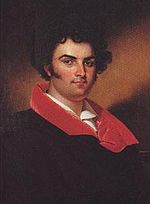La sonnambula
non credea mirarti / Sì presto estinto, o fiore ("I did not believe I would see you fade so soon, oh flower") from Amina's final aria is inscribed on Bellini's tomb in the Catania Cathedral in Sicily.Then Bellini experienced the re-occurrence of an illness which had emerged in Venice due to pressure of work and the bad weather, and which consistently recurred after each opera.By 15 July they had decided on a subject for early 1831, but it was uncertain as to whether Pasta was interested in singing a trousers role, that of the protagonist, Ernani, in an adaptation of Victor Hugo's Hernani, later set to music by Giuseppe Verdi in 1844.With both men having various other commitments, by the end of November 1830 nothing had been achieved in the way of writing either the libretto or the score of Ernani[4] but, by January, the situation and the subject had changed.Bellini wrote that "[Romani] is now writing La sonnambula, ossia I Due Fidanzati svezzeri...It must go on stage on 20 February at the latest.Stagings were presented as frequently as every two years in one European or North American venue or another, and they continued through the 1950s bel canto revivals up to the publication of his book in 1971.[11] The opera was rescued from the ornamental excesses and misrepresentations more similar to the baroque style than the bel canto of Bellini when it was sung by Maria Callas in the now-famous 1955 production by Luchino Visconti at La Scala.Elvino arrives, exclaiming Perdona, o mia diletta / "Forgive me my beloved", and explaining that he had to stop on his way at his mother's grave to ask her blessing on Amina.The newcomer, who surprises the villagers by his familiarity with the locality, asks about the celebrations and admires Amina, who reminds him of a girl he had loved long ago.(Tu non sai con quei begli occhi / come dolce il cor mi tocchi / "You can't know how those dear eyes gently touch my heart, what adorable beauty".)Amina continues her sleepwalk and falls asleep on the sofa, but Rodolfo hears the sound of people approaching and, with no other way out, he climbs out of the window.As they are about to go to the church, Rodolfo enters and tries to explain that Amina is innocent because she did not come to his room awake – she is a somnambulist, a sleepwalker: (Duet, first Elvino Signor Conte, agli occhi miei / negar fede non poss'io / "I cannot deny, my lord, what my eyes have seen"; then Rodolfo V'han certuni che dormendo / "Certain people when they sleep go about as if awake".)Elvino refuses to believe him and calls upon Lisa to leave, but at that moment Teresa begs the villagers to be quiet, because Amina has at last fallen into an exhausted sleep.Elvino demands proof and Rodolfo, seeing the sleeping Amina walking across the high, dangerously unstable mill bridge, warns that to wake her would be fatal.non giunge uman pensiero / al contento ond'io son piena / "Human thought cannot conceive of the happiness that fills me".
("I did not believe you would fade so soon, oh flower").
This text from act 2, scene 2, of La sonnambula appears on Bellini's tomb in Catania

by Natale Schiavoni


Battista Rubini
sang Elvino







La sonnambula (disambiguation)Vincenzo BelliniWilliam de Leftwich DodgeFelice RomaniLa somnambule, ou L'arrivée d'un nouveau seigneurEugène ScribeJean-Pierre AumerTeatro Carcanoopera semiseriabel cantolibrettoscenariosoprano sfogatoGiuditta PastaGiovanni Battista RubiniMaria MalibransopranocontraltoCatania CathedralI Capuleti e i MontecchiLa FeniceLa ScalaBeatrice di Tendatrousers roleHernaniGiuseppe Verdipastoralsleepwalkertessituratrillscoloratura sopranoMikhail GlinkaKing’s TheatrePark TheatreHerbert WeinstockJenny LindEmma AlbaniToti Dal MonteMaria CallasLuchino ViscontiJoan SutherlandCovent GardenMetropolitan OperaNatalie DessaySanta Fe OperaDiana DamrauThe Royal OperaSalzburger LandestheaterStaatstheater am GärtnerplatzFrederica von StadeCecilia BartoliFanny Tacchinardi PersianiKarl BryullovVoice typeLuciano Marianimezzo-sopranoSwitzerlandAlessandro SanquiricoAdelina PattiAnna CaseLina PagliughiFerruccio TagliaviniCesare SiepiFranco CapuanaPreiser RecordsCesare VallettiGiuseppe ModestiEugenia RattiLeonard BernsteinNicola MontiNicola ZaccariaFiorenza CossottoAntonino VottoFernando CorenaSylvia StahlmanMargreta ElkinsRichard BonyngeMaggio Musicale FiorentinoLuciano PavarottiNicolai GhiaurovIsobel BuchananDella JonesNational Philharmonic OrchestraOndrej LenárdSlovak Radio Symphony OrchestraLucia AlibertiJohn AlerIris VermillionJesús López CobosEurodiscĽuba OrgonášováRaúl GiménezDilber YunusAlberto ZeddaConcertgebouwAmsterdamEdita GruberováJosé BrosMarcello ViottiMunchner RundfunkorchesterEva LindWilliam MatteuzziFrancesco MeliCarlo ColombaraSara MingardoOpéra de LyonJuan Diego FlórezIldebrando D'ArcangeloAnna MoffoPlinio ClabassiGianna GalliBruno BartolettiMario LanfranchiDaniel OrenMichele PertusiEvelino PidòMary ZimmermanHD videoMet Opera on DemandJessica PrattTeatro La FeniceGlinkaWayback MachineEaton, QuaintanceHolden, AmandaWeinstock, Herbert